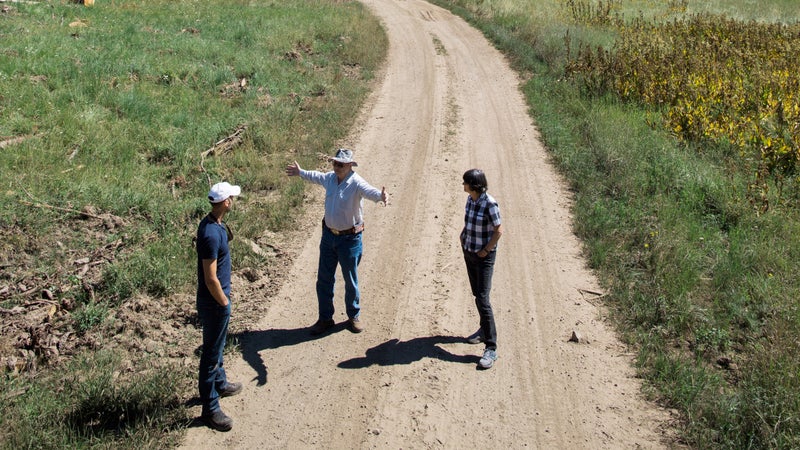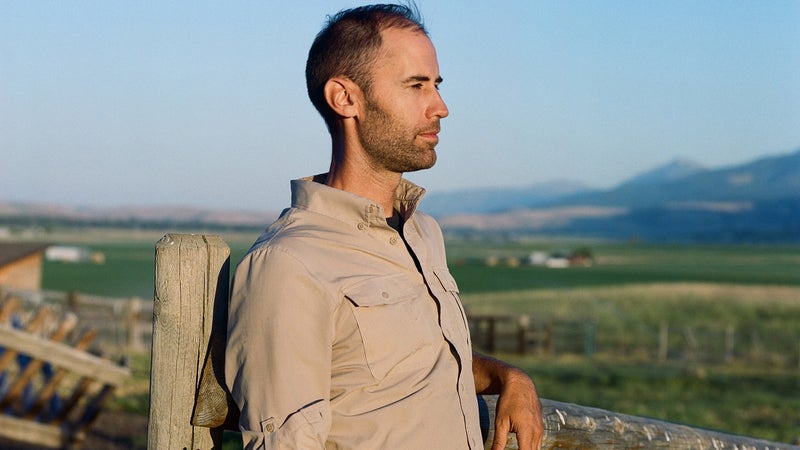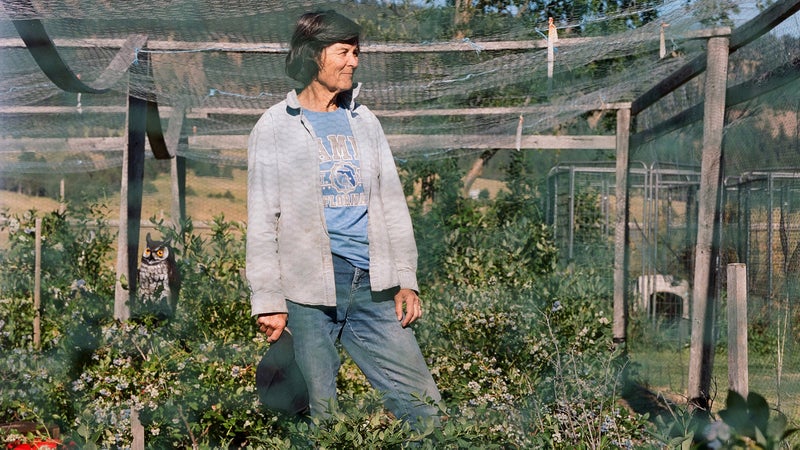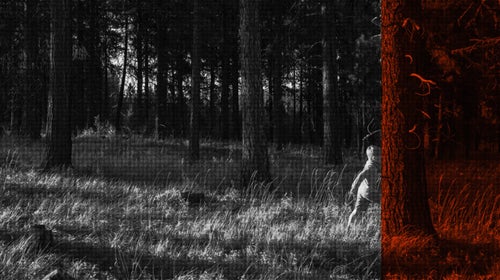How a 6-Year-Old Survived Being Lost in the Woods
As a child, Cody Sheehy made headlines when he vanished into the freezing wilderness of Northeast Oregon, making it out safely after 18 hours of determined slogging. Retracing his steps 32 years later, Sheehy says that getting lost was one of the best life lessons he ever had.
New perk: Easily find new routes and hidden gems, upcoming running events, and more near you. Your weekly Local Running Newsletter has everything you need to lace up! .
Cody Sheehy is standing in a grassy meadow in northeast Oregon, surrounded by dark pines, spruce, and juniper trees. Cody, 39 years old and six foot two, grew up in a ranching family here in remote, rugged Wallowa County. When he was six years old—a mere 40 pounds and three and a half feet tall—he got lost in these woods while playing with his older sister during a springtime family picnic. Within a few hours, a search party began looking for him, crisscrossing the Blue Mountains on horseback all night as rain fell and temperatures hovered just above freezing. They never found him.
Instead, Cody, who is now a Tucson-based documentary filmmaker and sailor, found himself. Over 18 hours, he walked an estimated 14 to 20 miles out of the mountains and into the sparsely populated Wallowa Valley. During that journey he fell into a river, climbed a tree to escape two terrifying coyotes, and hid from a passing car because—as he recalls it—his reptile brain had taken over. He was cold and exhausted, and he developed acute tendonitis in his ankles that put him on crutches for a week. But he saved himself.
The story was national news in 1986, appearing in newspapers around the country, and made the Paul Harvey show, a folksy radio program with millions of listeners. People sent Cody letters of congratulation, money, and Bibles. Some letters were simply addressed to the Lost Boy of Wallowa. His grandfather, a cowboy poet, wrote a ballad about him.
When I came across old newspaper clippings about Cody’s experience, I was stunned that he had walked himself to safety. My empathy and curiosity went into overdrive when I realized that he’d gone missing at age six, the age my son, Nico, is now. I tracked Cody down to see if he could answer an ultimately unanswerable question: Did that dark, long, bone-breaking walk make him the person he is today or merely reveal the inner strength he’d had all along?
Cody and I retraced his journey through the woods this summer. We first drove the route with Everett Roberts, who was a member of the search party. Then Cody and I walked a key section with Nico. Although Cody hadn’t been back through those -particular meadows and forest roads since that night in 1986, he remembered the area in vivid detail and anticipated the location of forks in the road, creeks, and other landmarks.

“When I fell in, I felt really cold,” he says with faraway eyes as we stand at Howard Creek. “After that my feet started to hurt.”
At a white house sitting all alone in the woods, which he recalls as highly spooky, he’s surprised at how pleasant it looks and how close to the road it is. “I remember the driveway as way longer,” he says. He looks for a tree nearby that he climbed to escape the coyotes. In the dust of the road he draws a picture of it, one branch sticking out to the side, low down.
Cody believes that he was changed by getting lost. “Over the course of your life, you push through a lot of physical barriers,” he says. “As you grow older, your first coach helps you break through barriers, and maybe in the military you learn to push through barriers or maybe in your first hard job. As a little kid, I had this opportunity to be tested and learn that there really aren’t any barriers. I think a lot of people figure that out. They just might not figure it out at six.”
Even as a child, Cody was a good walker. The Sheehys were cattle ranchers, and he spent a lot of time outdoors. He had hiked in the Wallowa Mountains with his family. He’d even hiked in Inner Mongolia, where his father, Dennis, worked for the International Fund for Agricultural Development, advising local governments on how to manage their land to avoid overgrazing and soil erosion. Dennis is a Marine Corps Vietnam vet who, while bleeding from a gunshot wound, crawled through a rice paddy and dense jungle to rejoin his comrades, earning a Purple Heart. In Oregon, Dennis wore a cowboy hat and boots and was known as All-Day Dens for his superhuman ability to work. “My dad is the toughest person ever,” Cody says. “He never quits. If I ever encounter something where I am just about to quit, I always think of my dad. He is tough to live up to.”
Cody was the kind of kid who played out of sight of adults, who caught crayfish and climbed trees and had to wait for the rare occasion when his family rented a TV and a VCR to have any screen time. (When they did, they always watched Star Wars.) He was also confident. So when he realized he was lost, he decided to follow a forest road and find his own way home.
I call search and rescue researcher Robert Koester, who wrote the book . “I imagine that exploring self-confidence is what leads you to say, Here is a road. I am going to follow the road, and it is going to take me somewhere,” he says. Koester explains that the distance Cody covered at such a young age makes his story unusual. He should know. He maintains a database of about 150,000 cases of people who got lost. “Right off the bat, he’s a statistical outlier,” he says.
“He was uniquely qualified to do what he did,” says Roberts, a Marine Corps veteran who at the time of the search was operating a forklift at a local Wallowa County mill. Roberts also believes there may have been an unseen hand with the boy’s survival. “His dad, Dennis, survived Vietnam. Maybe it’s just fate.”

Dennis was pleased to hear about Cody’s gumption when he got a letter detailing the story. He was in Inner Mongolia at the time, so the frantic searching and worrying was left to Cody’s mother, Marcie. But Marcie never blamed herself for being a bad mom—which, let’s face it, would be the first accusation to pop up in online comments if this story happened today. She never felt guilty for letting Cody and his sister play on the other side of the meadow from where she and a friend sat around the fire. “,” she says now. “Kids go off and play.”
“In my entire childhood, I never felt it was anyone else’s fault,” Cody says. “I felt responsible.”
I wonder if part of the reason that Cody walked so far was that he saw getting lost as his mistake and therefore saw finding himself as his responsibility. “I do remember I was focused on doing something, taking action,” Cody says.
Apart from the psychological matter of feeling like it was their job to get found, would a modern six-year-old be physically and psychologically able to do what Cody did? “It is always dangerous to make sweeping statements,” Koester says. “There are probably six-year-olds who still spend all their time running around and playing outside and looking for crayfish in the creek. The child who just sits in front of a screen isn’t going to do as well.”
Cody got lost during the kind of game that fewer and fewer kids engage in these days: explorers. He and his nine-year-old sister, Carrie, picked a tree and walked off in a different direction, then returned and shared any interesting finds. The whole point of the game was to be briefly and excitingly alone in the woods. But Cody didn’t come back. As the search wore on, his sister became annoyed with him for getting lost and disrupting the family’s plans for the evening. She’s a rancher now, with kids of her own. I ask her if she was scared for her brother that day back in 1986. “No,” she says, matter-of-factly. “Kids don’t get scared.” But as a mother, the incident has haunted her, especially when each of her own kids approached age six.
Here’s how Cody got lost: Heading back to the base tree, he crossed a clearing, plunged through the trees, and expected to see the fire that marked their picnic spot. Instead he saw an unfamiliar meadow. He backtracked to the first clearing, then continued in the opposite direction. Again he found an unfamiliar meadow. No fire, no family. He circled awhile longer, leaving small footprints pointed every which way.
Patches of snow still lingered in the low spots of the land, and dried stalks of yarrow and teasel stood out beneath a white sky. It was 2:30 P.M. He was wearing sweatpants, gloves, discount sneakers, and a puffy coat with a hood. This was the moment that Cody made up his mind, the moment that separates his story from so many others. Standing in an unfamiliar meadow, surrounded by silent ponderosa pines, thoroughly lost, Cody saw a dirt road and figured it had to lead somewhere. He decided to pick a direction and follow the road until he got there. By late afternoon, when the search for him got started, he was already miles away.
“In retrospect, I liked having something to focus on rather than just being panicked and scared and vulnerable,” Cody says. “It’s a lot scarier to be sitting in the woods in the dark, lost, than it is to be in the woods at night but walking home.”
“Some kids will sit down and stay in one place,” says Koester. “If you are in the open woods and there is no landmark to follow, then the majority of six-year-old kids are going to circle.” So it wasn’t surprising that the search party concentrated its efforts around Deerings Meadow, where Cody was last seen. But lost people also latch on to linear features, like a road, Koester says.
Standing in the same meadow today, Cody says, “I should have sat down.”
He’s right. Search and rescue experts say that in most situations, it makes sense to stay in one place if you’re lost, especially if you’re a kid. Chances are good that you’re close to where your searchers will start looking, and chances are also good that people will start looking immediately. The National Association for Search and Rescue teaches kids to “hug a tree.” The program was established after a nine-year-old boy died of hypothermia while lost on Palomar Mountain in California in 1981.
Would a modern six-year-old be physically and psychologically able to do what Cody did? “The child who just sits in front of a screen isn’t going to do as well,” search and rescue researcher Robert Koester says.
Although he didn’t know to stay put, Cody was lucky that the path he chose led down. He lived on the floor of Wallowa Valley, with its clear Wallowa River and green landscape of cattle and hay, homeland of Chief Joseph’s band of Nez Perce, almost completely encircled by forested mountains, like a secret valley in a fairy tale or legend. If he had gotten lost in the steeper Eagle Cap Wilderness, across the valley, down might have been easier to find. Here in a rolling section of the Blue Mountains, though, undulating meadows and knolls spread out in every direction. He could only hope that the forest road was taking him out, not farther in.
By twilight, some six to nine miles from where he started, Cody came to a fork in the road. He chose the right-hand fork and walked down it awhile, then had second thoughts. But his small, increasingly sore feet refused to backtrack all the way, so he decided to ford Howard Creek to reach the left-hand road. But at the bottom of a steep gully he slipped.
“I remember thinking I was going to fall in and thinking I didn’t care. And I fell in,” Cody says. He soaked his legs and an arm, then hauled himself out of the water, scrambled up the bank, found the road, and kept walking. It was around this time, he recalls, that he realized he wasn’t going to get dinner and that his situation was serious.
Cody was worried about getting in trouble for getting lost. The sooner he got back to his family, the less trouble he would be in. So he ran, then walked, ran, then walked, then ran, like that.
At some point, Cody’s thinking changed, he says. He developed tunnel vision. He heard a buzzing in his ears. “Any noise, any sound, I hid,” he says. He hid from engine noise, maybe more than once, potentially evading his would-be rescuers. He just had to keep going. He figured that if he could walk to his house, down in the valley, and sneak into his bed before the sun rose, he could roll out of bed in time for breakfast and everything would magically be OK. “I had a singular mission,” he says.
Later, as his stomach began to gnaw at him, he revised his plan, adding a stop at his grandfather Tom’s place. He imagined that the old cowboy would be awake and reading in his chair. He would give Cody grapes. And then Cody would walk the five or so additional miles to his own home and slip into bed.
At 7:52, the sun set completely, and the stars began to appear. Cody kept walking. He wanted to be an astronaut when he grew up, so he watched the sky, distracting himself from the pain in his feet by looking for Halley’s Comet, which was visiting the solar system that year. From Wallowa County on April 27, the comet would have been just under the horizon.
By now there were dozens of people out searching for him, some in trucks, at least half a dozen on horseback, including the local Catholic priest, Father Ray Hopp. Marcie was driving forest roads with Tom, crying and praying. With temperatures so low, searchers worried about Cody becoming hypothermic. But they underestimated how far he could travel in the time he’d been lost. Their circle was too small.
Cody kept moving. He walked another six and a half miles from the creek, up a steep hillside and through dark stands of firs and pines. He came to an abandoned white house, which looked eerie in the starlight. (Now it has been fixed up as someone’s country place and does not look spooky.) There was no moon yet.

It was here he saw the two coyotes. Cody stopped to watch them. They walked toward him, and Cody sprinted away, fearing that they were following him. These days there are wolves in Wallowa County, but in the eighties coyotes were the top dogs and common. Usually, they give people a wide berth, but they have been known to attack children.
Terrified, Cody climbed into a tree, probably a juniper, and wedged himself between the trunk and a sturdy branch. There in the dark, pressed up against the pitchy gin smell of the bark, he dozed. At 12:41 A.M. on Monday, April 28, 1986, the moon rose. It was just three days past full, so it cast a bright silvery light over the pines, the junipers, and a few wizened apple trees from an old orchard.
“It was really cold in that tree,” Cody remembers. “It got so cold I couldn’t sleep. I couldn’t stay in the tree, so I decided to keep walking.” He had traveled 12 to 15 miles by now. His feet hurt. The forest opened up beyond the house, and Cody walked through a series of grassy meadows, pale and silent. “I remember continual disappointment that it was farther each time I came to a new meadow,” Cody says. “I spent a lot of time looking at my feet.”
The sun rose at 5:41, and around that time, Cody came to the edge of the plateau he’d been walking on, at about 3,700 feet of elevation. Looking into the valley, almost 1,000 feet down and two more miles by road, he saw houses, roads, pastures, and distant livestock. But it wasn’t a part of Wallowa he recognized. His feet were in agony. I’ve got to get down there, he remembers thinking.
Cody is helping my son, Nico, dismount from a pine tree he has climbed. We are walking the part of his journey between the creek and the white house. Looking at Nico’s tiny frame, his spaghetti legs, his little feet, it’s as if Cody were alarmed for his childhood self.
I tell Nico he can ask Cody any question he wants. “OK,” says Nico. “What is the largest land mammal?” Later he asks Cody something a bit more germane. “When you were lost, did you climb up a tree to see where you were?” Cody looks up, trying to remember. “I don’t know why I wouldn’t have. Maybe I did.”
Nico tries to be tough, but after a few miles he starts casually asking how much longer we have to go. In the dust of the road, we find coyote tracks.
While we walk, Cody catches us up on his life since 1986. Maybe because he found himself, the experience made him bolder, not more wary, he says. “I’ve never considered myself a very brave person, but I have always climbed trees to the very top.”
His mother agrees. “He is a risk-taker,” Marcie says. In middle school, he climbed to the top of a high-voltage transmission tower near his house because it was tall, scary, and had a ladder, and he wanted to feel the electricity buzzing in his body.
Cody eventually left Wallowa to attend college at Oregon State and then Portland State. To pay for it, he spent summers building trails in the Eagle Cap Wilderness, about 14 miles as the crow flies from where he’d been lost. He and his coworkers would ride into the hills on horseback, carrying their tools on pack mules. They’d work all day and sleep in the mountains for ten days at a stretch.
Cody comes from a military family, but he decided that wasn’t for him. During college he bought a beat-up sailboat on a whim, a 27-footer moored in a Portland marina on the Columbia River. After living on it for a while, he figured he’d give skippering a try. He got advice from his neighboring boat owners, taught himself the basics, then decided to sail south. He was mostly alone, staying awake for 24 hours, glued to the tiller. After nearly getting run over by a container ship in San Francisco Bay, he headed toward Monterey, where he ran out of money.
Cody’s persistence hasn’t changed since he was six. Even after walking down that steep mountain road and reaching town , he planned to keep going on his own and walk all the way home.
In 2008, Cody scored a broken-down 54-foot sailboat for spare change from a Bay Area techie who was selling off his pleasure craft during the financial crash. He sailed that boat all the way to Nicaragua with his wife—a Finnish geographical information scientist named Jatta, who he married in 2011—and their two dogs, spending months free and mobile.
Cody bailed out of a career in engineering when film called to him. As with sailing, he learned in his own way, through experimentation and mentorship rather than formal training. Today, Cody works as a producer for the University of Arizona and runs two companies. One, Rhumbline Media, makes documentary films; the other, Filmstacker, is working on an app that allows groups of creators to combine short clips into finished movies. Cody puts in long hours every week on these endeavors, and he misses the thrill of the sailing life. “It’s like you’re Han Solo and you have your own little spaceship,” he says. “You can get to the most rugged, remote wilderness, 100 miles from the closest village, or have an island all to yourself.”
He’s worried about getting too comfortable, settling into a routine, though he still sails off the coast of Mexico for a month every year. Before, when he and Jatta were on the water for months at a time, he felt “totally alive,” he says. “I am trying to get back to that feeling. I think I still can. I don’t think I’ve screwed it up yet.”
Cody’s persistence hasn’t changed since he was six. Even after walking down that steep mountain road and reaching town, he planned to keep going on his own and walk all the way home. Eventually, a teenager waiting for the bus talked him into accepting help by promising him cookies. They knocked on the door of an older lady, who called the sheriff. A lawman picked Cody up. When he got home, his sister Carrie tried to take off his shoes, and he screamed in pain. As soon as his legs and feet healed, he was back out playing in the woods.
Cody and his wife are thinking of having some kids of their own, even though Cody admits to still feeling like a big kid himself. “I think I would be a good dad,” he says. “I aspire to be a parent who lets my kid run around a ton. I would love if my kid had all the crazy experiences I had growing up and survived them. But it’s pretty scary to think about.”
As dusk settles in, Cody, Nico, and I set up camp on top of a hill at the edge of the plateau where Cody would have seen the lights of the valley glimmering in the dawn. Nico finds some elk teeth and then falls asleep in our tent while Cody and I have a beer. Nighthawks begin diving so steeply that air roars through their primary feathers, filling the night with sound. Like he has since he was six, Cody skips a tent and sleeps under the stars.
When Cody bought his current boat, it was named Endymion, after a handsome shepherd from Greek mythology who was loved by the goddess of the moon. Perhaps wanting to cast aside associations with livestock and herding that smacked of Wallowa, Cody changed the name. But he says it’s bad luck to rechristen a boat “unless it has been so significantly altered that Poseidon cannot recognize it,” and he found out that there was likely a coin stamped endymion under the mast. So he changed the name back. Maybe the experience of getting lost is like a coin under Cody’s mast, something that creates a continuous identity between his childhood self and his adult self. Either way, it taught him a lesson he’s never forgotten. It’s a lesson about “persistence and what it can unlock,” he says. “I am the kind of person that will fight to the very end.”
The next morning, it’s time to pack up our tent and head home. Nico looks dubiously at the expanse of cheatgrass ahead of us. He spent a lot of the previous day picking the poky seeds out of his socks. Cody swoops him up, adding 40 pounds to the weight of his pack, and carries Nico down the hill.
Emma Marris () wrote about a wolf named OR-4 for �����ԹϺ��� Online in October 2017. She is the author of .


